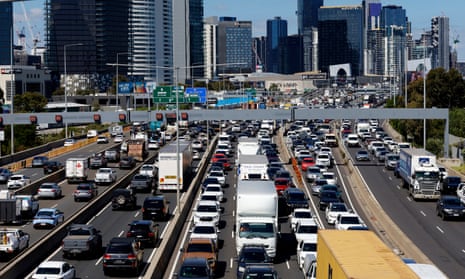
Cars sold in Australia in 2023 emitted as much CO2 as 156 coalmines, analysis shows
Finding comes as public consultation for the proposed fuel efficiency standard closes, with advocates warning of a loophole for SUVs
Cars sold in Australia by just five companies emitted as much carbon dioxide in 2023 as 156 standard coalmines, analysis shows, as advocates eager for the government’s proposed fuel efficiency standard warn of a loophole for SUVs.
However as the Albanese government considers the views of industry players on its proposed fuel efficiency standard, tensions are firming between auto manufacturers and environmental groups about how strict the new rules should be.
The standard will place a yearly cap on the emissions output for new cars sold in Australia to incentivise carmakers to supply low- and zero-emissions vehicles and penalise companies that do not. The cap will be lowered over time.
The latest window for public consultation on a fuel efficiency standard closed on Monday, almost a month after the government unveiled its preferred option for a standard. It plans to introduce legislation before July that will take effect from January 2025.
The government’s preferred model is expected to deliver a reduction of 369m tonnes of CO2 by 2050 – equivalent to the last six years of emissions from light vehicles in Australia.
Australia, along with Russia, remains one of the few countries in the OECD without standards. Industry analysts have routinely warned manufacturers are treating Australia as a dumping ground for heavy-polluting vehicles due to a lack of penalties.
A new car sold in Australia uses, on average, 6.9 litres of fuel per 100km compared with new cars in Europe and the US that use 3.5 litres and 4.2 litres, respectively.
The Climate Council, in its submission to the government, said the proposed settings “are the minimum needed” to reduce emissions and reduce the cost of driving for Australians.
“Anything less than this will see us continue to languish at the back of the queue for more efficient low and zero emissions vehicles,” the Council said.
On Wednesday, the Council also released an analysis that found cars sold by Toyota, Ford, Hyundai, Renault-Nissan-Mitsubishi and Mazda to Australians in 2023 emit as much C02 in a year as would be from the burning of the coal mined from mines.
Toyota’s 2023 sales will emit 547,919 tonnes of CO2 in a year, more than the coal mined from the Narrabri Underground Mine in a year, which would emit 519,704 tonnes when burned. Ford and Hyundai’s 2023 sales will each emit about 309,000 tonnes of C02 in a year.
Meanwhile, the Grattan Institute, in its submission, played down concerns the fuel efficiency standard will “end the weekend” and see utes phased out, as some critics have claimed.
after newsletter promotion
“It will not, particularly since the targets are in line with those in the US and almost certainly achievable without major negative impacts on consumers,” the Grattan submission said in response to the “end the weekend” claim.
“It is true that the average price of lower-emissions vehicles may increase, but on average by about only 1%. Lower fuel and maintenance costs mean that consumers will quickly be better off than they otherwise would be – and will be far better off in the long term,” it said.
Grattan’s chief concern is the government’s proposal to set different targets for passenger vehicles and light commercial vehicles instead of a single set of targets.
Tony Wood, director of Grattan’s energy and climate change program, said this puts emissions reductions at risk via a “perverse incentive”, given the surge in SUV ownership in Australia.
SUVs fall under the light commercial vehicle category, and critics claim the huge uptake of the more polluting larger cars has occurred in part due to tax perks incentivising the vehicles for families and small businesses that don’t require its size.
“In the US, for example, although targets within each segment have consistently been met, the effectiveness of the scheme has been undermined because people have continued to abandon passenger vehicles in favour of SUVs and light trucks,” Grattan’s submission said.
“Across its entire fleet, the US recorded an increase in average vehicle emissions from new car sales in 2019, compared to 2018 – despite most manufacturers meeting their targets,” Grattan said.
Toyota, Australia’s most popular vehicle brand, last week said the proposed fuel efficiency standard was “aggressive” and “too quick” for manufacturers. A Toyota spokesperson said the company had made a submission in the latest consultation window.